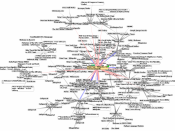The Web is an increasingly important resource in many aspects of life: education, employment, government, commerce, health care, recreation, and more. It is essential that the Web be accessible in order to provide equal access and equal opportunity to people with disabilities. An accessible Web can also help people with disabilities more actively participate in society.
In 1997, the Federal Electronic and Information Technology Accessibility and Compliance Act was proposed in the U.S. legislature to correct the shortcomings of the original section 508; the original Section 508 had turned out to be mostly ineffective, in part due to the lack of enforcement mechanisms. In the end, this Federal Electronic and Information Technology Accessibility and Compliance Act, with revisions, was enacted as the new Section 508 of the Rehabilitation Act of 1973, in 1998.
Section 508 addresses legal compliance through the process of market research and government procurement and also has technical standards against which products can be evaluated to determine if they meet the technical compliance.
Section 508 of the Rehabilitation Act requires access to the Federal government's electronic and information technology. The law covers all types of electronic and information technology in the Federal sector and is not limited to assistive technologies used by people with disabilities. It applies to all Federal agencies when they develop, procure, maintain, or use such technology. Federal agencies must ensure that this technology is accessible to employees and the public to the extent it does not pose an "undue burden." The law directs the Access Board to develop access standards for this technology that will become part of the Federal procurement regulations.
There is nothing in section 508 that requires private web sites to comply unless they are receiving federal funds or under contract with a federal agency. Commercial best practices include...


